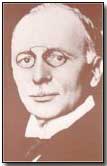Who's Who - Ante Trumbic
 Ante Trumbic (1864-1938), the Croatian
nationalist leader, was born in Austro-Hungarian Dalmatia on 17 May 1864.
He attended school in Split and studied law at Zagreb, Vienna and Graz,
where at the latter he received a doctorate in 1890. From 1894 Trumbic
practised as a lawyer in Split.
Ante Trumbic (1864-1938), the Croatian
nationalist leader, was born in Austro-Hungarian Dalmatia on 17 May 1864.
He attended school in Split and studied law at Zagreb, Vienna and Graz,
where at the latter he received a doctorate in 1890. From 1894 Trumbic
practised as a lawyer in Split.
A moderate reformer and a member of the Austrian lower house, the Imperial Council, since 1897, Trumbic favoured constitutional reform of Austria-Hungary's Slav provinces, and was not a member of the separatist or pan-Slav movements originating in Serbia. From 1905 Trumbic served as the Mayor of Split.
With the July Crisis in the wake of the assassination of the Austro-Hungarian heir to the throne, Archduke Franz Ferdinand, Trumbic fled to exile in Italy, from where he sought, vainly, to build Allied support for South Slav independence.
With the Allies inclined instead to listen to Serbia's calls for a Greater Serbia, Trumbic established the so-called 'Yugoslav Committee' in May 1915, a group in which he served as Chairman.
Operating from London the Yugoslav Committee argued for the liberation for 'oppressed' Habsburg Slavs. Further, Trumbic's group worked to convince Nikola Pasic's Serbian government to sponsor the notion of a union of the Croats, Slovenes and Slavs, an idea regarded with great mistrust by Pasic who remained intent upon the simple expansion of Serbia via territorial gains from a beaten Austro-Hungarian empire.
With the Russian Revolution of 1917, and the consequent withdrawal of Serbia's primary diplomatic champion, Trumbic pressed the case for the creation of a Yugoslavia. Under pressure, Pasic compromised with the agreement of the Corfu Declaration of July 1917, although he subsequently worked behind the scenes in an attempt to discredit the Yugoslav Committee, fearful that the Allied governments would regard the Committee as the rightful government in exile once the war was over.
Nevertheless, on 1 December 1918 a new 'Kingdom of Serbs, Croats and Slovenes' was declared by Crown Prince Alexander (Serbian King Peter I's regent), a confirmed champion of the Yugoslav concept. Trumbic was appointed Foreign Minister of the new government, with Pasic temporarily out of favour and power.
At the Paris Peace Conference Trumbic concerned himself with Italian territorial ambitions in Croatia, which were eventually settled in 1920. He resigned as Foreign Minister on 22 November that year and worked thereafter to protect minority interests, notably those of Croats, in the Serb dominated new Kingdom (which was subsequently renamed Yugoslavia in October 1929).
By 1929, when King Alexander I determined to establish a benign dictatorship, a dispirited Trumbic was already publicly regretting the demise of the Austro-Hungarian empire.
Ante Trumbic died in Zagreb on 17 November 1938 at the age of 74.
An "incendiary shell" is an artillery shell packed with highly flammable material, such as magnesium and phosphorous, intended to start and spread fire when detonated.
- Did you know?
